10 Must-Read Books for INFJs
It’s no secret that INFJs are book lovers. Enter any INFJ group or forum and you’ll see countless threads about “favorite books”. Reading is by far one of the favorite pastimes of most INFJs (including myself). Books provide a respite from a weary world, an escape into the imagination, and, in some cases, helpful advice for the ups and downs of life. There are so many wonderful books out there, and so many books that INFJs love to read, so this was a hard list to narrow down. I asked as many INFJs as I could to tell me which books were their favorites, then I tallied up the ones with the most responses.
Not sure what your personality type is? Take our new personality questionnaire here. Or you can take the official MBTI® here.
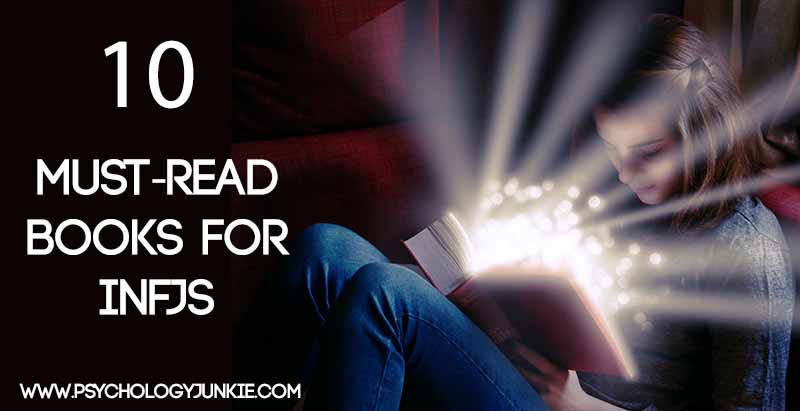
P.S. If you want even more in-depth information on INFJs and relationships, careers, parenthood, and more check out my eBook: The INFJ – Understanding the Mystic.
Table of contents
Estimated reading time: 14 minutes
Why are INFJs drawn to these specific books?
INFJs look for several things when they read a story: depth, fascinating characters, symbolism, and mystery. They like a story that forces them to use their intuition and insight to get hints or guesses about what will play out. They like stories that ask tough questions about the meaning of life and the nature of psychology. They love books that look honestly at the purpose and struggle of the human condition. Reading for the INFJ is more than just an escape, it’s a chance to understand humanity in a deeper way and solve mysteries about the meaning of life. All this taken into account, I am pretty sure many NFs, in general, would be drawn to these particular stories (some were voted for by other NF types and will surely wind up on their lists!)
This post contains affiliate links. I only recommend books I truly love and believe in.
10 Books Every INFJ Should Read
#1 – The Little Prince

“And now here is my secret, a very simple secret: It is only with the heart that one can see rightly; what is essential is invisible to the eye.”
– Antoine de Saint-Exupery, The Little Prince
The Little Prince is a timeless tale of love, loneliness, and meaning. It tells the story of a young boy who leaves the safety of his own planet to travel the universe in search of adventure. INFJs will appreciate that the book isn’t a straightforward children’s story, but also a moral allegory that discusses the underlying meaning of relationships, the fleeting nature of life, and the importance of imagination. They will also appreciate the symbolism prevalent throughout the book. Each motif and landscape means something; the rose, the desert, the water. Everything is symbolic. Find out more here: The Little Prince Family Storybook: Unabridged Original Text
#2 – The Divine Comedy


“Consider your origin. You were not formed to live like brutes but to follow virtue and knowledge.”
– Dante Alighieri, The Divine Comedy
Dante Alighieri is the quintessential INFJ author; his writing is filled with mysterious, symbolic, and profound messages. INFJs will be mesmerized by Alighieri’s visions of the afterlife; Inferno, Purgatorio, and Paradiso. In the poems and stories readers will find inspiration, terror, adventure, monsters, and lessons of good and evil. Find out more here: The Divine Comedy
#3 – Brave New World


“Words can be like X-rays if you use them properly…they’ll go through anything. You read and you’re pierced.”
– Aldous Huxley, Brave New World
Brave New World is one of the original dystopian novels, written in 1931 by English author Aldous Huxley. This book captures a vision of a technologically-advanced future where humans are bred genetically, socially indoctrinated, and pharmaceutically anesthetized to survive passively under an authoritarian rule. There is no freedom anymore, no spirituality or soul-searching. How will humanity survive like this? What will become of a people without any sense of individuality? INFJs will appreciate the vision and scope of Huxley’s writing, and will likely reflect on the possibility of a similar scenario playing out in the future. Find out more here: Brave New World.
#4 – A Wrinkle in Time
“Life, with its rules, its obligations, and its freedoms, is like a sonnet: You’re given the form, but you have to write the sonnet yourself.”
– A Wrinkle in Time
A Wrinkle in Time follows the adventures of Meg Murry, her younger brother Charles Wallace, and their friend Calvin as they try to rescue her father from the forces of evil in a heart-stopping journey through space. INFJs will enjoy the mind-bending, “otherworldly” nature of the book. This book opens the imagination to lush new landscapes and terrifying beasts and temptations. This is a read-in-one-sitting, edge-of-your-seat sci-fi that is filled with heartfelt wisdom and advice that we all need to hear. Find out more here: A Wrinkle in Time (Time Quintet)
#5 – Crime and Punishment


“Pain and suffering are always inevitable for a large intelligence and a deep heart. The really great men must, I think, have great sadness on earth.”
– Fyodor Dostoyevsky, Crime and Punishment
Crime and Punishment is the quintessential INFJ fiction. This suspenseful, psychological novel tells the story of a poverty-stricken Raskolnikov, an intelligent student who is grappling with his conscience after he murders a vile, cynical old pawnbroker. This book goes beyond Raskolnikov’s actions and unveils the psychological turmoil of crime and the innate struggle and beauty of the human condition. Find out more here: Crime and Punishment
#6 – Man’s Search for Meaning
“Everything can be taken from a man but one thing: the last of the human freedoms – to choose one’s attitude in any given set of circumstances, to choose one’s own way.”
– Viktor E. Frankl, Man’s Search for Meaning
Psychiatrist Viktor Frankl’s memoir captures the details of his life in Nazi death camps and his quest for spiritual revival in the midst of intense suffering. Between 1942 and 1945 Frankl labored in four different camps, including Auschwitz, while his brother, parents, and pregnant wife died. In spite of all his loss, Frankl found that even though he couldn’t avoid suffering, he could choose how to cope and find meaning in it. Frankl’s theory – logotherapy, from the Greek word logos (“meaning”) – states that our primary drive in life is to pursue meaning over pleasure. The New York Times has called this book “An enduring work of survival literature”, and it has sold more than 10-million copies in 24 languages. Find out more here: Man’s Search for Meaning
#7 – Never Let Me Go
“I keep thinking about this river somewhere, with the water moving really fast. And these two people in the water, trying to hold onto each other, holding on as hard as they can, but in the end it’s just too much. The current’s too strong. They’ve got to let go, drift apart. That’s how it is with us, Kath, because we’ve loved each other all our lives. But in the end, we can’t stay together forever.”
– Kazuo Ishiguro, Never Let Me Go
A reunion with her childhood friends draws Kathy and her companions, Tommy and Ruth, into a study of memories and mysteries. These memories revolve around their childhoods at Hailsham, an isolated private school in the English countryside. At Hailsham the three friends were sheltered from the outside world, told they were special, and given very specific instructions about how to live their lives. The school’s efforts and mysterious rules and cliques were really just a facade for a terrifying truth that Kathy and her friends are now confronting as adults. INFJs will enjoy the depth, suspense, and atmospheric beauty of this story. Find out more here: Never Let Me Go
#8 – And Then There Were None
“There was something magical about an island – the mere word suggested fantasy. You lost touch with the world – an island was a world of its own. A world, perhaps, from which you might never return.”
– Agatha Christie, And Then There Were None
Ten people are invited to an island for the weekend. Each harbors a shameful secret, but none are aware, until they each start dying off one by one, that there’s a pattern to each guests secret. Panic ensues when the guests realize one of their own is the killer. This incredibly suspenseful mystery created the template by which many mysteries have since been copied, and this book is considered by critics to be Christie’s greatest technical achievement.
Agatha Christie is believed by many typologists to have been an INFJ; her visionary writing, ability to connect the dots, and insight into human nature have made her stand out as one of the greatest exponents of classic detective stories.
#9 – Jane Eyre by Charlotte Bronte
“I am no bird; and no net ensnares me; I am a free human being, with an independent will; which I now exert to leave you.”
– Charlotte Bronte, Jane Eyre
Jane Eyre tells the story of an orphan who is abused and treated with cruelty as a child only to emerge as a young woman with tremendous integrity and depth of character. She takes a post as the governess at Thornfield, where she meets and falls in love with Mr. Rochester. Unfortunately, her love story is far from simple or painless. There are mysteries and dangerous secrets that threaten to break her heart as she searches for a life of meaning beyond tradition and Victorian society. Find out more here: Jane Eyre (Penguin Classics)
So many NFs voted for Jane Eyre as their favorite book, so whether you’re an ENFP, INFP, ENFJ or INFJ, I’m sure you’re bound to find comfort and beauty in its pages.
#10 – The Stand by Stephen King
“Show me a man or woman alone and I’ll show you a saint. Give me two and they’ll fall in love. Give me three and they’ll invent the charming thing we call ‘society’. Give me four and they’ll build a pyramid. Give me five and they’ll make one an outcast. Give me six and they’ll reinvent prejudice. Give me seven and in seven years they’ll reinvent warfare.”
– Stephen King, The Stand
In the wake of an apocalyptic pandemic, a diabolical adversary emerges from the ruins to rule in tyranny. A tattered band of survivors, comprised of a fragile old woman, a deaf mute, and a disabled person among others are the only group to oppose him. This story is part allegorical tale of good vs. evil and partly a portrait of good taking on the form of humility and seeming weak while evil takes on the form of domineering strength. King based this book on the Book of Revelations in the Bible, and also on Jesus’s words in the Sermon on the Mount: “Blessed are the meek, for they shall inherit the earth.” Find out more here: The Stand
Stephen King is believed by many typologists to be an INFJ. A.J. Drenth from Personality Junkie states, “Stephen King, most certainly an INJ type, describes his process of writing novels. He is adamant about the fact that he does not consciously plan or piecemeal the plot or direction of his stories. Rather his stories emerge from his unconscious as preexisting wholes, requiring little as far as conscious effort or planning.” You can read more from Drenth here.
What Are Your Thoughts?
Do you love these books? Do you have any suggestions? Share your thoughts with other readers in the comments!
You can also learn A LOT more about the INFJ personality type with this INFJ starter kit and course from Personality Hacker.
Disclaimer: This article contains affiliate links. I only recommend products I truly believe in.
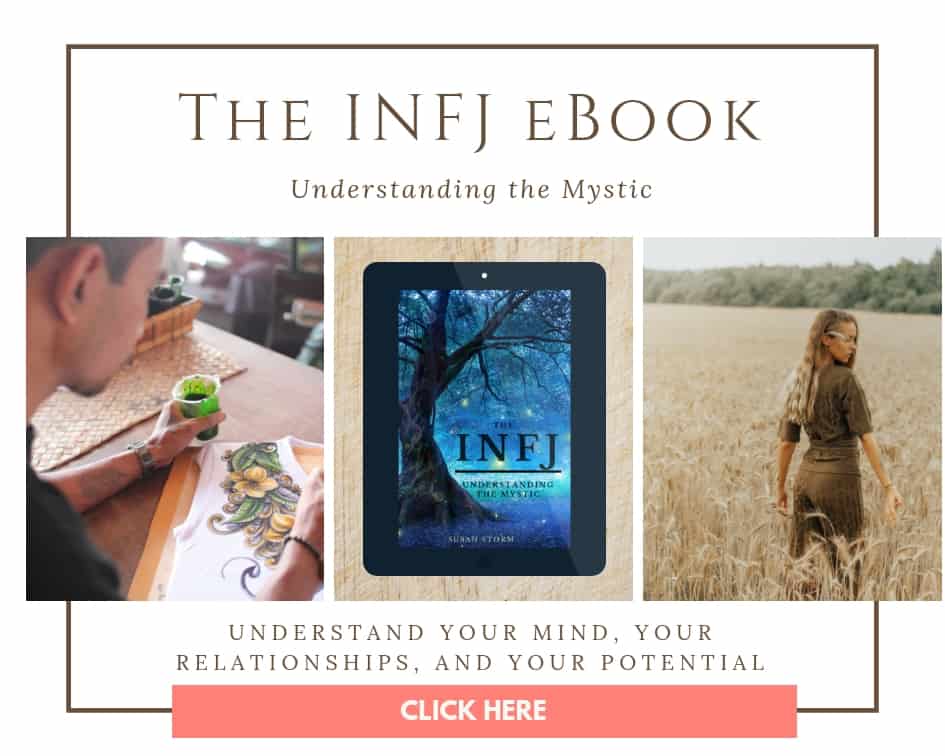
Other Articles You Might Enjoy:
10 Books You Need if You Want to be a Myers-Briggs® Expert
The 5 Biggest Misconceptions About INFJs
Why INFPs and INFJs Are Drawn to Sad Things
The Four Reasons INFJs Struggle with Loneliness
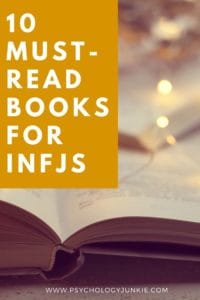
Get Your Free INFJ eBook
As a thank you for subscribing to my newsletter I will send you this free eBook PACKED with self-care tips, creativity hacks, and more! You'll also get a 3-day email course for understanding your personality type better!












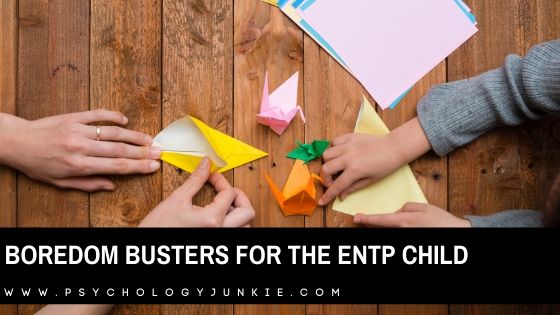
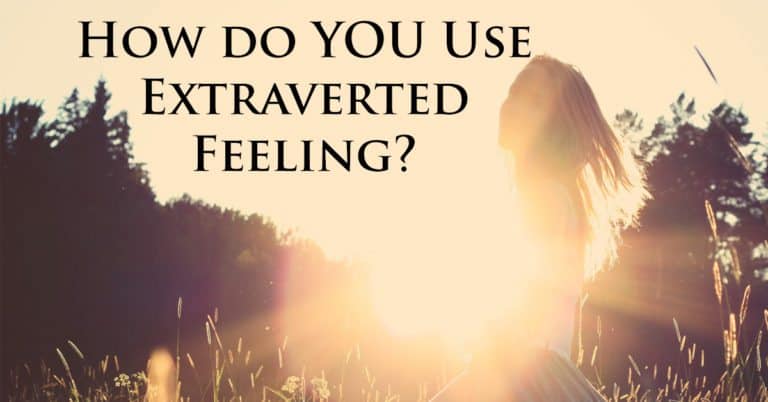
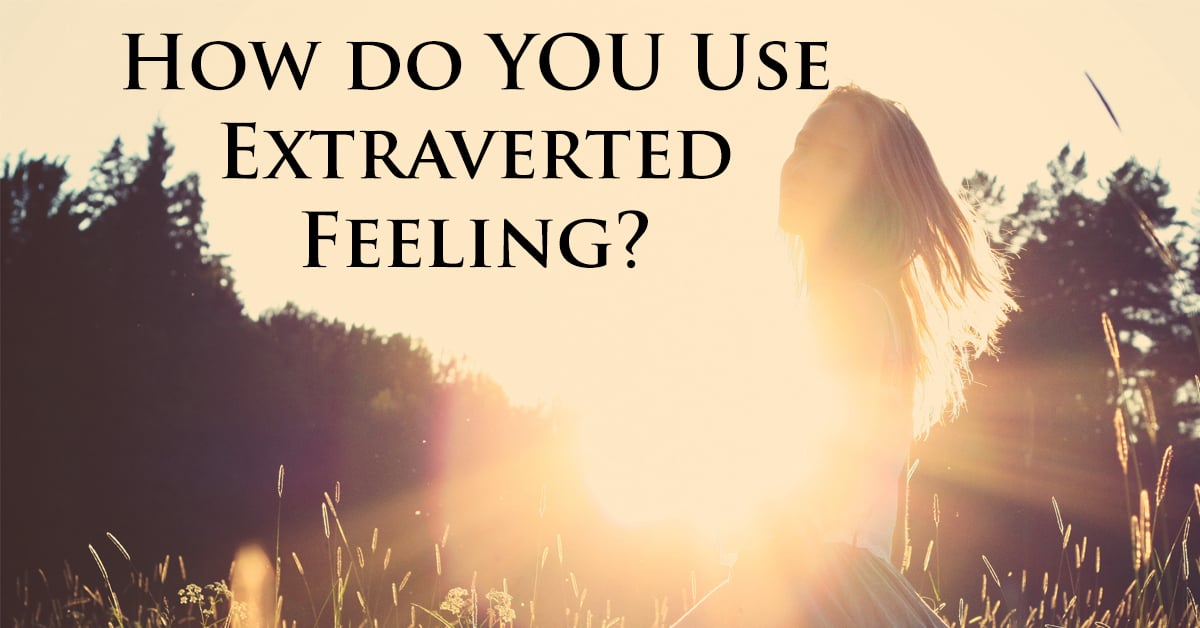

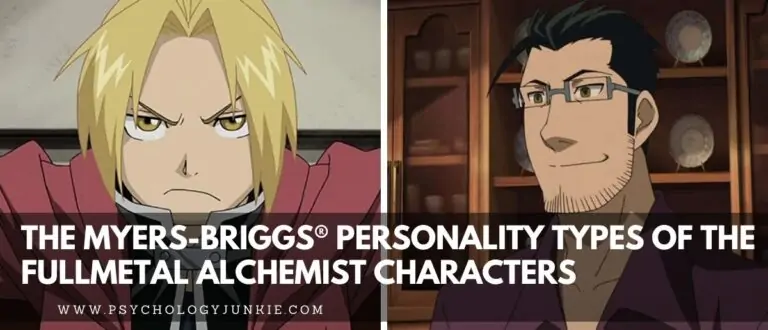
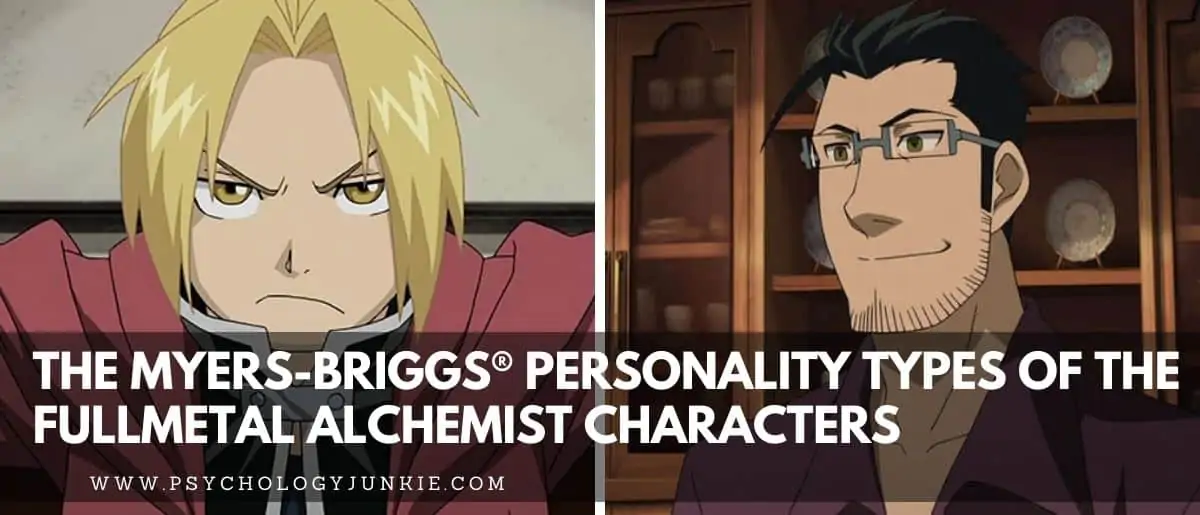
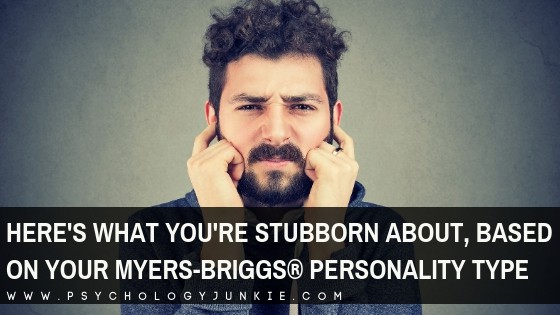
Sorry. Not a fan of most of these. Frankl one of my favs, however.
What books do you enjoy? 🙂
I read Crime & Punishment my senior year of high school and remember liking it a lot (although now 30 years later I couldn’t tell you anything about it really)…maybe I should reread it now knowing I am INFJ.
I really enjoyed reading “All you need is kill” by Hiroshi Sakurazaka and “Ender’s Game” by Orson Scott Card. In both books we can see what makes the characters tick
“The Stand” is my favorite book of all time. No wonder!!
The Stand is also my favorite! This quiz is right on. I also recommend Alias Grace for INFJ’s.
I really enjoyed Juliet from Anne Fortier, is my favorite book 🙂
I really enjoyed Juliet from Anne Fortier, is my favorite book 🙂
I also think that other INFJs would enjoy books like How to Train Your Dragon and the Wingfeathersaga.
I remember loving How to Train Your Dragon, and one of my favorite books was the little prince, lol
I can’t get enough Ernest Hemingway or Albert Camus, but my fav is P.G. Wodehouse!
In high school, I really enjoyed Lord of the Flies. The psychology involved was very intriguing.
Although it’s written toward a younger audience, The Mysterious Benedict Society ranks among my all-time favorites for too many reasons to list here.
I’m reading Jane Eyre for the first time and it’s truly wonderful. I find myself to be quite at home with Jane’s personality, especially with her inner dialogue.
I’m a fan of Huxley. I can’t stand Stephen King. Although I’m not a fan of “Jane Eyre,” my favorite genre of fiction is neogothic novels. I have no patience for children’s novels, especially fantasy. “Crime and Punishment” is overly pretentious. As previously mentioned, I quite like neogothic novels such as Setterfield’s “The Thirteenth Tale,” O’Farrell’s “The Vanishing Act of Esme Lennox,” and nearly everything by Kate Morton. I quite like historical fiction, and can go for nuanced romances. For example, Stephanie Meyer’s “The Host” transcends sci-fi (which I generally abhor) and adds complexity to the idea of romance. Contemporary British Lit is quite good. Syal’s “Life isn’t all Ha Ha Hee Hee,” Zadie Smith’s “White Teeth,” Hornby’s “A Log Way Down,” Alex Garland’s “The Beach” are all novels that INFJ types might enjoy. I also like nonfiction memoir’s such as “Lucky” by Alice Sebold, Timothy Tyson’s “Blood Done Sign My Name, and other provocative memoirs. I occasionally enjoy potato chip novels that help bring me out of my pensive states… essentially romcom style novels. I also enjoy Young Adult fiction (typically historical fiction YA novels) for a nice balance between provocative and not too heavy. Finally, I love short stories for their twists and deep meaning in spite of their short storylines.
I think pride and prejudice should be in this list
I 2nd that
This is great but no list is complete without Illusions: The Adventures of a Reluctant Messiah by Richard Bach. One quote from the book is the most significant for me: “Argue for your limitations and, sure enough, they’re yours.” This quote hung on my wall at work (a crisis intervention center) and helped inform my choices when I was in my twenties when the book was published in 1977. I’ve internalized the quote by now, of course. The meaning of the quote changed over the years. When I was young it was about overcoming fears and limiting myself less, and then in my 40’s as I came to understand that we all have limitations, choosing those limitations consciously and thoughtfully is the key.
Testament Of Youth by Vera Brittain. I really identified with this book growing up and her struggle to get to University against her family’s wishes was very motivating. Vera’s life was dedicated to peace and social justice after the horrific experience of serving in World War 1.
I don’t usually read or view anything that describes violence. I am effected by it and can’t get images out of my mind afterwards. This lasts a long time so I am surprised at this reading list. I love Jane Austen and the Narnia books. I often listen to books.
Books to add to the list:
1- Tuesdays with Morie – My go-to book when I’m feeling lost
2- The Giver
3- Sythe
4- The Me I Want to Be
5- The Shack
The only one of these I have read is Jane Eyre, but these don’t sound like books I would like. Does that mean I might not be an INFJ or I’m just a different kind.
I also did not find these books appealing. In fact, I found the stories odd and depressing. It may be partly due to watching the movies first.
I n particular, “NEVER LET ME GO” was evil and horrifying at the end.
It may be that I am leaning more toward INFP.
My favorite book at the moment is Jane Austen s PERSUASION.
And I love all of Lucy Maud Montgomery ‘s Anne books. And A GRAVESTONE MADE if WHEAT.
I’d reccomend Herman Hesse ( generally ) especially “ Siddhartha” while about the life of Bhudda , it’s a small simple and moving book.
Siddartha by Herman Hesse
I have only read and loved two titles out of the ten listed here: 1. Men’s search for meaning and 2. Jane Eyre.
For some reason I do not like exaggerated si-fi books or movies. I believe we find meaning in everything and if we talk about books here are some titles that moved and inspired me (the way my favourite 10 list would look like):
3. Flowers for Algernon by Daniel Keys
4. Of mice and men by John Steinbeck
5. Veronika decides to die by Paulo Coelho
6. Secret life of bees by Sue Monk kidd,
7. To kill a mockingbird by Harper Lee,
8. Shadows thief by Mark Levy
9. Siddartha by Herman Hesse
10. Cloud Atlas by David Mitchell
1. Meditations by Marcus aurelius
About life and attitude
2. Mans search for meaning by v. Frankl
About How to Think about suffering
3. Forty rules of love by elif safak
About love and life, great inspiring story of Rumi
4. The devil and miss prim by Paolo Coelho
About good and evil
5. Outwitting the devil
Interesting and intriguing perspective on things that hold us back
Excellent suggestions, thank you Susan~
You’re welcome! Thanks for reading! 🙂
I read most of these books and really liked them
This is a fantastic list. Thank you. I love love love The Little Prince so much that I bought a $100 version because it’s supposedly the best translation. Total INFJ book with symbolism and depth.
I’m just sad that my FAVORITE book series wasn’t on the list.
Harry Potter
Yes, I am an INFJ too…
;c
Same!
Crime and punishment – The Best. I love the Little Prince too. I hate fantasy books which are usually recomended for INFJ. Maybe I have more “ST”?
Me, too, Mia. I love Dostoevsky (Crime and Punishment just one of them) but dislike fantasy.
I loved most of the suggested books: Little Prince, Crime and Punishment, Jane Eyre, all of Agatha Christie, all of Steven King.
The other suggestions – i just haven’t read =)
Thank you! These are going into my “to read” list
OMG! I’ve doubted if I’m really an INFJ (and still doubting, of course, being an over thinker…) But this list surprises me. Almost every single book here I’ve either read or want-to-read!
I’ve read Jane Eyre, A wrinkle in Time, and I’ve ALWAYS wanted to read And then there were None, Never let me go, Brave New World, Divine Comedy (but is it in Italian?) and A Little Prince
English translations exist.
The Book Thief! I’m an INFJ, and this book has had the biggest impact on me as a writer and as a human.
This is one of my favourite books too!
I’ve always scored as an INFJ on tests, and this post made me laugh… #3, 4, 8, 9 are all my favourites! I haven’t read the rest, so will give them a whirl sometime 🙂 Other faves are Agatha Christie (Ms Marple series) and Sherlock Holmes by Alfred Conan Doyle (both Jeremy Brett and Benedict Cumberbatch are faves).
Thanks for an interesting list, I haven’t been reading much since I was a kid because I found it quite difficult to find a book that would touch my heart in the right way 😊
But from what I’ve read, I really loved ‘Rebecca’ by Daphne du Maurier, ‘Agnes Grey’ by Anne Brontë or ‘Lord Jim’ by Joseph Conrad – I could connect with the main characters so much ❤️
As an INFJ , I have read and enjoyed most of these. Jane Eyre is my favourite on this list followed by Never Let Me Go. I would add the French novel Le Grand Meaulnes
( The Lost Estate in English) by Alain Fournier to this list; it appeals to my intuitive imaginative side.